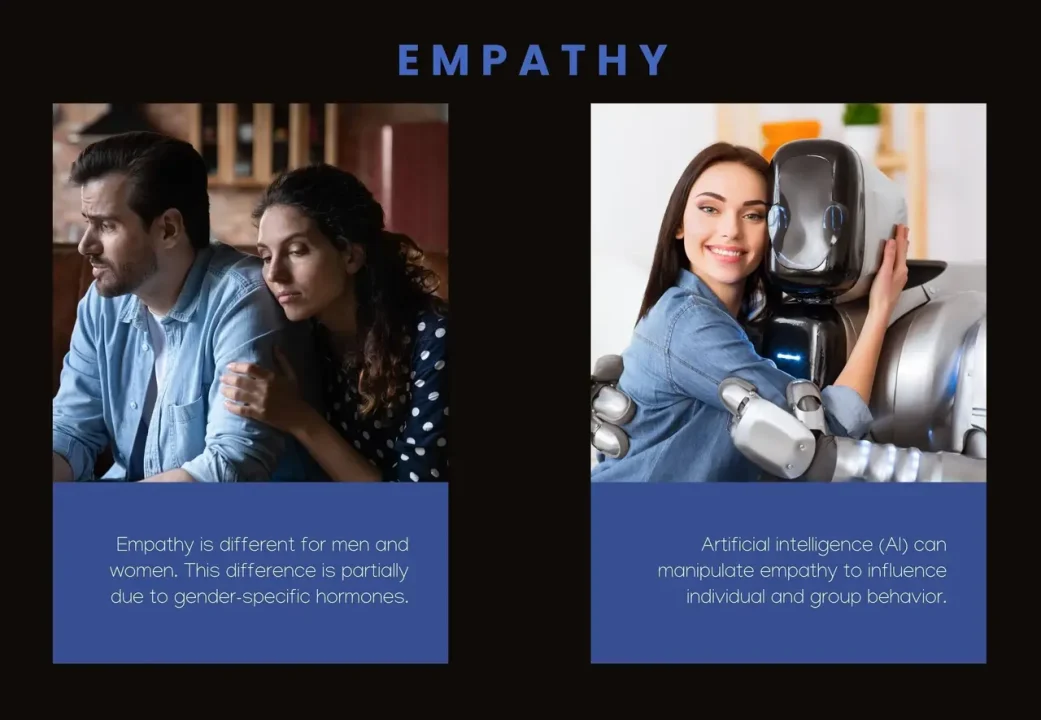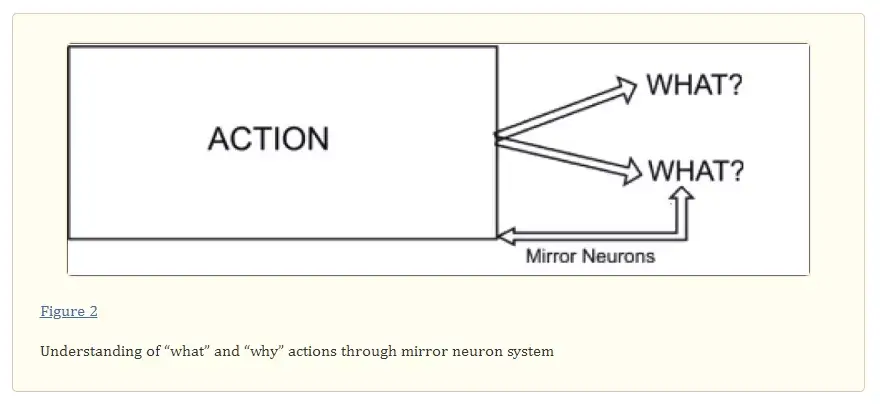Reading time: 12 minutes
— Researched and written by Dr. Sandip Roy.These are some of the most interesting findings on empathy from psychology:
1. Empathy Has Many Dimensions.
Empathy has at least three dimensions — how we think, how we feel, and how we act.
- Cognitive empathy is understanding another person’s perspective, mental state, and thought processes. It is the thinking element of empathy.
Say, when a friend loses their job, your cognitive empathy lets you think, “They must be feeling so uncertain about the future.”
- Affective empathy is the emotional element of empathy and is sometimes called emotional contagion. It lets us share, understand, and feel the emotions of others, creating a sense of emotional resonance.
When you see a child crying because they dropped their ice cream, you might suddenly feel upset.
- Compassionate empathy encompasses our actions to show that we have concerns for and are moved by another’s feelings. It is the behavioral element of empathy.
It might mean giving a long hug to someone who is grieving, letting them know you are moved by their pain and want to help them feel less alone.
A bad case of this multidimensional nature of empathy is the Dark Empath (DE) — a dark triad personality with high cognitive empathy.
Dark empaths understand other people’s emotions but do not feel those emotions themselves, nor feel sympathy for or desire to help them. They use their ability to empathize to get people to do what they want.
2. Empathy Makes Us Into Communities.
Empathy is the bridge where people meet with their prosocial behaviors — helping, sharing, and cooperating.
More than letting us feel where the shoe pinches on another’s foot, it is how those feelings propel us to interact positively in our relationships and communities.
Empathy can lead to kind and supportive acts. It has been traditionally viewed as a key trait in reducing aggression (Heym, Firth, et al., 2019).
However, empathy can also lead to acts of defiance and insubordination, playing a pivotal role in issues like social justice and community survival.
Empathy weaves our social fabric, nurturing individual connections into thriving communities. Without empathy, we may never feel the need to build connections or tribes.
Before passing away, Stephen Hawking told us, why we need more empathy in our society today.

3. The Roots of Empathy Are Diverse.
Empathy is not just about being ‘nice’ or ‘kind’; there’s more to it. Think of it like a puzzle with pieces from our nature and nurture.
Genetically, some of us are naturally more attuned to others’ feelings, showing that empathy has some roots in our DNA.
Then, there’s the brain’s role. Certain brain areas light up when we empathize, like the anterior insula, anterior cingulate cortex, medial prefrontal cortex, and mirror neuron system. So, we already have a neurological setup playing a key role in how we perceive and respond to others’ emotions.
And here’s the crucial part: our environment. How we’re raised, the values we learn, and the cultural context we grow up in significantly shape our empathic abilities.
If you’re brought up in a nurturing environment, where understanding and caring for others is practiced, you’re more likely to develop a strong sense of empathy.

In contrast, if empathy is not valued in your upbringing or culture, it might not come as naturally to you. Psychopaths often grow up without empathy, and the reason may be their difficult childhood.
So, when we talk about empathy, we’re talking about a complex mix of genes, inborn traits, and our life experiences, making it a fascinating aspect of social and survival behavior.
4. Empathy Is A Learnable Skill.
You may have a certain ability to empathize, but it need not remain fixed. An exciting aspect of empathy is that we can actively work on to enhance our empathy skills.
Research has shown that empathy can be cultivated. Like a muscle that can be strengthened with practice, someone with low empathy can be taught to act with empathic concern.
Mindfulness training, perspective-taking exercises, and empathy-focused education programs are three common ways to learn empathy.
Mindfulness training
It teaches us to be present in the moment and more aware of our own and others’ emotions. Being mindful helps us tune into subtle emotional cues from others, enhancing our ability to empathize.
Perspective-taking exercises
These are about practically putting on someone else’s shoes and grasping their pain-points and feelings better.
Here are two perspective-taking exercises:
- Role Reversal Exercise: Pair up with someone to discuss a recent event or a personal situation. The one who did not experience the event explains it from the perspective of the one who experienced it. The focus is on how they think the other one felt and why they might have re/acted the way they did. Afterward, the person who experienced the event provides feedback on the accuracy of the perspectives taken and discusses any inconsistencies. This helps both people understand and articulate the feelings/thoughts of others, as well as encourages active listening.
- Imaginary Life Narrative: Spend some time alone and imagine living a day in the life of someone very different from yourself. This could be someone from a different culture or socioeconomic background. Or someone with a different job or family structure. Write a short narrative from their perspective, detailing their daily activities, challenges, thoughts, and emotions. Reflect on how it makes you feel, and what new insights or understandings you may gain about their life and troubles.
Empathy-focused education
These programs are structured to systematically teach the principles of empathy, guiding learners through recognizing and responding to others’ emotional states.
That empathy is not a static quality means we can learn to be more understanding and compassionate with people in our personal and work lives.
5. Situations Shape Our Empathy.
Empathy is not always constant.
It can be influenced by various situations such as stress, cognitive overload (too much on your mind), and the nature of the relationship between the empathizer and the person they are empathizing with.
Stress can greatly affect our ability to empathize. It’s like trying to listen to someone while you have a loud alarm ringing in your ears.
When our minds are stuffed with information or tasks, it can impair us to fully understand and share another’s feelings. This is often a reason we react in anger to someone asking for help.
The nature of relationships with the person we’re trying to empathize with plays a crucial role. You may find it easier to empathize with friends or family, but not so with strangers or people you have a complex history with.
So, empathy is not a dynamic trait, swayed by our immediate circumstances and relationships.
6. Empathy Differs Across Genders.
Research suggests that empathy is different for men and women.
Studies, like the one by Wuying & Jiamei, 2014, indicate that women generally display higher levels of empathy compared to men.
This difference is partially credited to gender-specific hormones.
- Scientists have found that the hormone oxytocin, found in higher levels in human females, is positively correlated with emotional empathy.
- In contrast, testosterone, more prevalent in men, tends to be negatively correlated with cognitive empathy.
However, we must understand that these biological factors are just one piece of the puzzle. The way we’re raised and the norms we’re exposed to also significantly shape our empathic abilities.
Socialization and cultural influences (like “be a man,” “man up,” and “act as a proper lady”) play a significant role in shaping empathic abilities.
From a young age, girls and boys are often taught and encouraged to express emotions and empathy differently.
This blend of biological and social gender roles makes the topic of gender and empathy a complex one.

7. AI Can Move Us With Virtual Empathy.
Now, the cutting-edge topic: the intersection of empathy and AI technology.
Recently, there’s been a surge in research focusing on how artificial intelligence (AI) and virtual reality (VR) can enhance and even manipulate our empathy to influence individual and group behavior.
AI, with its ever-growing capabilities, has a two-edged potential to simulate empathetic interactions. This could range from chatbots that can mimic human emotions to more complex systems that can read and respond to our emotional cues.
The core idea going forward will be to use AI to better understand human emotions and, in some cases, to train people in empathetic skills — but disallow manipulating humans for negative reasons.
One question here: Do you think the AI companies have already developed Artificial General Intelligence (AGI) — an intelligent agent that can self-learn to accomplish any intellectual task that humans can do?
Virtual reality (VR) takes this further by immersing users in environments that can evoke real emotional responses.
An immersive experience can allow us to walk in someone else’s shoes, see the world from their perspective, and feel what they feel.
Several Canadian universities are using VR and AI to help people better understand the effects of climate change (long-term shifts in temperatures and weather patterns due to human activities), which researchers say helps build environmental empathy.
8. Empathy Affects Mental Health.
There is a complex relationship between empathy and depression:
- Higher affective empathy might mean more vulnerability to depression (Yan & Zeng, 2021).
- High affective empathy might increase the risk of depression in women (Schreiter, 2013).
- Low self-compassion and harsher self-judgment might be linked to affective empathy and depression.
- Depression might also lead to poor empathy and negative symptoms like social anhedonia.
Interestingly, Heym & Heasman (2019) found that inflammation can make it hard to understand other people’s viewpoints, even in the general population.
Empathy also comes with many mental health advantages for the empathizer.
It can help healthcare and social work professionals build strong relationships with clients/patients. This can make them feel more engaged and purposeful at work, helping them deal with the emotional demands of their jobs better.
Moreover, empathy can increase our resilience by boosting our self-esteem, making us feel less lonely, and giving us a stronger sense of identity.
9. The Empathy of Mirror Neurons.
Now, let’s turn to one of the most fascinating discoveries in the last decade of neuroscience — mirror neurons.
In the early 1990s, Italian researchers found that individual neurons in the brains of monkeys fired both times:
- when the monkeys grabbed an object, and
- when the monkeys watched another primate grab the same object.
They named these specialized brain cells mirror neurons. Mirror neurons also exist in humans.
The mirror neurons develop based on our sensorimotor associative learning, rather than being a direct result of specific genetic adaptation.
This means that mirror neurons are activated not because they have a specific evolutionary purpose or adaptive function, but because they respond to similar actions being performed or observed.
Cook, Bird & Catmur, in their study Mirror neurons: From origin to function, 2014, explore this. They point out that human infants acquire enough sensorimotor experience to train these mirror neurons.
This early development process is crucial for shaping our ability to empathize and connect with others as we grow.
Essentially, mirror neurons allow us to respond to actions that we observe in others. So, when we see someone smiling, our mirror neurons for smiling are activated, helping us understand and share their happiness by smiling back.
Interestingly, mirror neurons also have a role in one of the most intriguing aspects of our complex thought process — “intention understanding.” They help us not just understand the actions of another person, but also their intentions.

What’s particularly intriguing about mirror neurons is their adaptability. They can change significantly through sensorimotor training.
This suggests that our capacity for empathy and understanding others has enough reasons to grow and refine right from when we were children. It also reinforces the idea that empathy is a learnable skill.
10. We Need To Balance Empathy With Self-Care.
We must balance empathy with self-care.
Otherwise, excessive, one-sided empathy can cause empathy burnout, empathy fatigue, and compassion fatigue.
Empathy, while a source of fulfillment and connection, can also be emotionally taxing. But remember that you can only provide empathy and support to others when your own emotional cup is full.

Taking on empathic distress from others coupled with being self-absorbed in one’s emotional reaction and suffering can increase the risk for depression, emotional burnout, and compassion fatigue.
Professions that require high levels of empathy, such as healthcare, social work, or education, often find themselves constantly giving emotionally.
People in these high-empathy fields should recognize their own emotional limits to maintain their well-being.

Setting boundaries, obligatory time for oneself, and doing things that replenish emotional energy can help avoid burnout and fatigue from one-sided empathetic engagements.
Seek support when you feel you cannot handle high-empathy roles.
Final Words
In my experience, it is crucial to have people to talk to when you’re distressed, especially if you’re alone in caring deeply about an issue.
Invest time and other resources to find your tribe of empathetic friends. They will understand you without judging your feelings and help you take constructive action.
Finally, we often see empathy as a positive, desirable trait. However, researchers have found that being empathetic can also lead to apathy, aggression, and even cruelty.
What do you think — How can empathy be dangerous and hurtful?
√ Also Read: Do Narcissists Have Empathy?
√ Please spread the word if you found this helpful.
• Our Story!